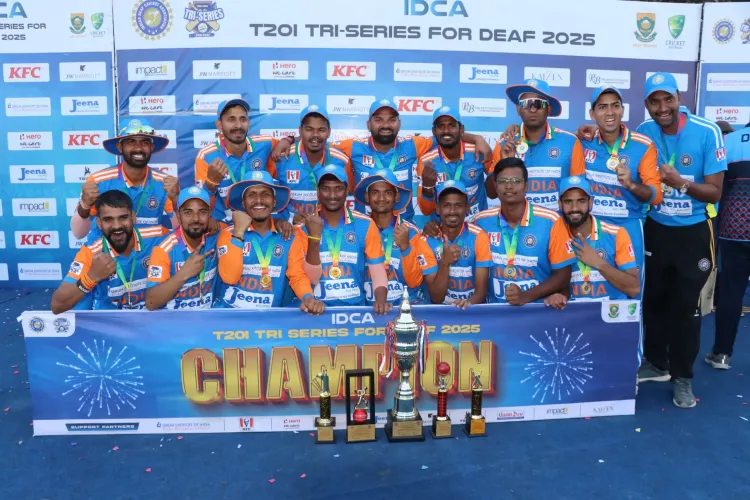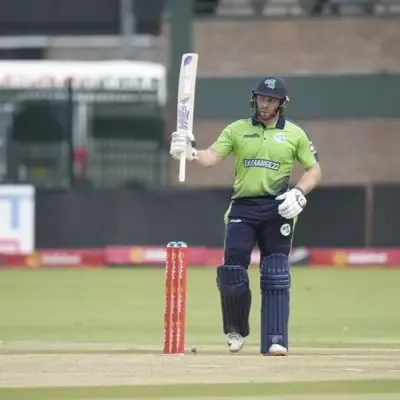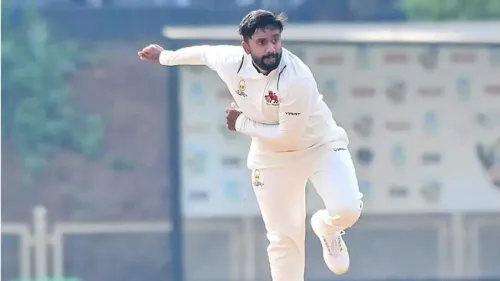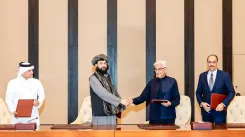India Secures Tri-Series Title for Deaf with Seven-Wicket Victory Over Australia

Synopsis
Key Takeaways
- India won the Tri-series title, defeating Australia by seven wickets.
- The tournament showcased exceptional talent from hearing-impaired cricketers.
- Coaching strategies played a crucial role in India's victory.
- The event highlighted the importance of family support for players.
- The IDCA aims to promote cricket among hearing-impaired athletes globally.
New Delhi, April 8 (NationPress) The thrilling T20 International Tri-series for the Deaf, featuring India, South Africa, and Australia, reached a breathtaking conclusion with a final match between India and Australia at Karnail Singh Stadium on Saturday. This eagerly awaited tournament, organized by the Indian Deaf Cricket Association (IDCA), showcased remarkable talent and sportsmanship from hearing-impaired players across all participating teams.
The Indian team captured the championship by defeating Australia by seven wickets in a suspenseful finale, which was an exciting experience for the vibrant crowd present at Karnail Singh Stadium.
Guided by captain Virender Singh, the Indian deaf cricket team was meticulously selected by the All-India Men’s Selection Committee. They prepared intensively for this significant tournament with the support of coach Dev Dutt and assistant coach Susheel Gupta.
The head coach praised the team’s performance and the effectively implemented strategies that led to their triumph.
“The tournament was fantastic. We are delighted that India has emerged victorious. The coaching staff made the strategic decision to field first if we won the toss, and the captain executed the plan perfectly, which yielded a series win. We are set to start our One-day series against Australia on Monday, aiming for a 3-0 victory. A couple of our batters need some improvement, and we will assess the squad for the ODI series, resting those who require it,” Dev Dutt told IANS.
Reflecting on the experience of playing in India, Australia’s head coach Job van Bunge expressed his joy in returning to the country, noting that every visit feels like coming back to a “bigger party.”
“It’s been incredible. I have visited India previously, and every return feels like a grand celebration. Playing cricket here is immensely rewarding. Although we fell short in the final against India, they displayed remarkable discipline, and we are grateful for this experience,” van Bunge shared with IANS. “The IDCA has been exceptional; the venue is beautiful, the support has been outstanding, and overall, this tournament has had a wonderful atmosphere,” he added.
Throughout the tournament, players from all three teams seized the opportunity to demonstrate their skills, proving their mettle in each match. The fierce competition and outstanding performances throughout the series kept fans captivated, truly portraying the essence of the sport.
As the event concluded, Team India lifted the trophy, while individual accolades for exceptional performances were awarded, celebrating the accomplishments of these remarkable athletes who overcame challenges to excel on the field.
Highlighting the significance of the tournament, Sumit Jain, President of IDCA, remarked, “The enthusiasm exhibited by the players in this fiercely competitive tournament emphasizes the necessity to advance cricket among hearing-impaired athletes globally. I extend my congratulations to all teams for making this tournament a resounding success.”
“Their spirited participation in the tri-series truly signifies the promising future of deaf cricket and serves as an inspiration for many other players. We look forward to hosting more series like this to continue appreciating the unique athletic abilities of hearing-impaired athletes,” he expressed.
Following the match, families of both finalist teams joined in the celebrations, leading to dances with all three teams participating. The jubilant crowd of supporters cheered for the players. Both head coaches acknowledged the importance of families traveling with the teams for such tournaments, asserting that it helps players perform to their fullest potential.
“Having families travel with the team is crucial; we are far from home, and for many players, it’s their first time away. The support around them is vital for making them feel comfortable and enabling peak performance,” said van Bunge.
“When representing your country, and your team wins, families share in the celebration, giving children the chance to say, ‘Look, I helped my country win.’ Their support is always significant,” concluded Dutt.









